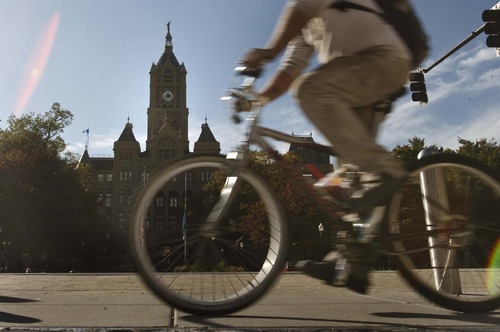This is an archived article that was published on sltrib.com in 2012, and information in the article may be outdated. It is provided only for personal research purposes and may not be reprinted.
When Scottish blacksmith Kirkpatrick MacMillan invented the bicycle in 1839, he couldn't have known it would spark a political debate in Salt Lake City 173 years later.
But in 2012, the human-powered two-wheeler is more popular than ever in Utah's capital city, and trends seem to indicate that bicycle popularity will continue to grow. Call it back to the future.
The question at City Hall is, how much influence should bicyclists have in shaping Salt Lake City's future transportation strategies?
One group argues that bicycling is more than transportation: It also takes into account recreation, environment (clean air), land use and economic development. They argue that bicycling should have its own advisory board within city government to bring a strong cycling voice to all those topics.
The other side, including Mayor Ralph Becker, contends that bicycling is a transportation mode and must be integrated into the city's overall transportation planning. As such, they say bicycling could have its own subcommittee, but must be within the Transportation Advisory Board.
The debate is more than political hair-splitting, according to those tussling with the issue for the past six months.
In April, Becker dissolved the decades-old Mayor's Bicycling Advisory Committee that was independent of City Hall and staffed with volunteers.
The decision was met with strong criticism from the cycling community that has worked hard to get bike lanes, trails, signs and a bike safety program in Salt Lake City.
But David Everitt, Becker's chief of staff, said dissolving the ad hoc committee was necessary. "The current informal approach simply does not work anymore," he said in a letter to the volunteers.
Becker had earlier appointed bicycle advocate Jonathan Springmeyer to sit on the city's Transportation Advisory Board.
Nonetheless, members of the defunct Mayor's Bicycle Advisory Committee said they believed bicycling needed a bigger voice in city government. They proposed creating a Bicycling Advisory Board within city government.
"Salt Lake City is poised to become a great American bicycling city," said Dave Iltis, the former chairman of the Mayor's Bicycle Advisory Committee. "In order to get there, we need an independent city board."
In the coming weeks, Iltis will make that case to the City Council, which ultimately will decide how much sway bicyclists have in planning the city's future.
City Councilman Luke Garrott agrees that bicycling cuts across many aspects of society. He favors creating a Bicycling Advisory Board, rather than a subcommittee under the Transportation Advisory Board.
"Making it a subcommittee is doing it a great disservice," he said. "It's taking something that has multiple dimensions and squashing it into a flat box."
But Everitt contended that all modes of transportation affect land use, economics and environment. "The mayor believes that issues surrounding all forms of transportation should be integrated," he said.
He added that a subcommittee approach would not push bicycle advocates out of strategic planning.
"Anyone who believes the importance and value of bicycling will diminish, I think, is fooling themselves," Everitt said.
Springmeyer, the Transportation Advisory Committee member who came from the old Mayor's Bicycle Advisory Committee, said Becker's commitment to bicycling is not being questioned.
"I've been the lone bicycling representative on the Transportation Advisory Committee for five years. But I've never felt like I was a lone voice," he said. "Cycling has come a long way in Salt Lake City in the last five years."
But when Becker leaves office, the cycling community wants to know it won't lose ground to a new administration that may not be as cycling-friendly, Springmeyer said.
"We want to make sure our viewpoint is heard in the next administration."



